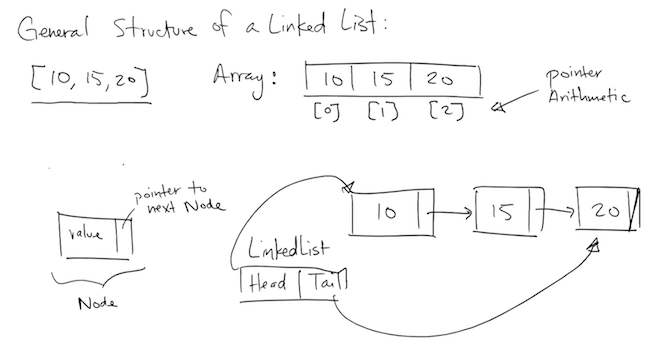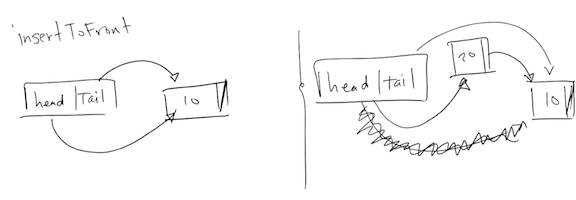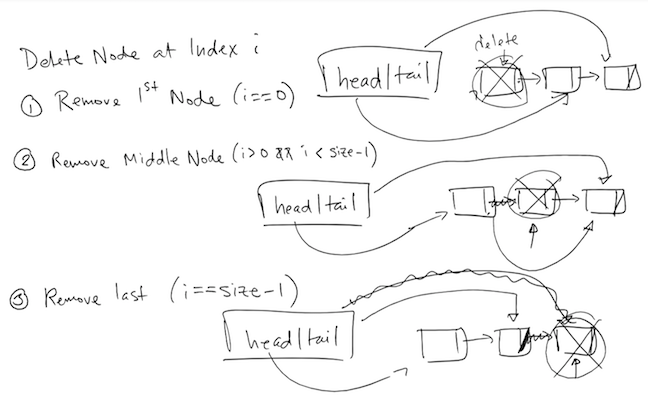| Previous Lecture | Lecture 12 | Next Lecture |
Lecture 12, Thu 08/09
Linked Lists, Midterm 2 Review
Linked Lists
- There are many ways to organize data (data structures)
- We’ve seen examples of stacks and arrays
- But there are others like trees, tries, hash tables, …
- And there are many ways to IMPLEMENT these data structures
- Some may use arrays (like arrayLists or vectors)
- Some may use object pointers to link structures together.
- Linked lists form a collection similar (but also very different) than an array.
- We can represent any type of data using structs.
- For example, an ITEM (Node) in a linked list can be a struct that contains some data (like a string, int, double, char, or another struct).
- The NEXT element in a linked list is a pointer to a linked list node representing the next item in the collection.
- Since we don’t know how many elements a linkedList may contain, managing this structure on the heap is essential!
Linked List Structs
- There are many ways we can implement a linked list, but we will focus on an singly-linked list implementation with a head and tail reference.
- A LinkedList struct will contain two pointers to linked list nodes:
- one points to the first element of the list (head)
- the other points to the last element of the list (tail).
- A node in a linked list will contain some data, and a pointer to the next Node in the linked list collection.
struct Node {
int data;
Node* next;
};
struct LinkedList {
Node* head;
Node* tail;
};

Example of “walking down” a linked list
- Assume we have a linked list with the following nodes:
[10]->[20]->[30]->null
- We can walk down the collection and visit every node by using each Node’s next pointer as long as the next pointer != NULL.
cout << list->head->data << endl; // 10
cout << list->head->next->data << endl; // 20
cout << list->head->next->next->data << endl; // 30
cout << list->head->next->next->next->data << endl; // seg fault!
- The performance of certain functionality with data structures largely depends on how the data is organized under-the-hood.
- On a high-level, arrays and linked lists are conceptually the same.
- However, depending on what kind of operations performed on the data structure, performance may greatly differ. For example,
- inserting to the front of a singly-linked linked list is much faster than inserting to the front of an array.
- directly accessing an element in an array is much faster than directly accessing an element in a linked list.
- However, depending on what kind of operations performed on the data structure, performance may greatly differ. For example,
insertToFront() Linked List
- Order of pointer reassignment matters since we always want to make sure we don’t “lose” the address of something we need on the heap.
- Create new node to insert
- Assign new node’s next pointer to the current list’s head.
- Reassign the list’s head to the new node.

deleteIndex(int index)
Case 1: Remove first element
- Reassign list head to list head’s next pointer.
- delete first element.
Case 2: Remove middle element
- Reassign previous node’s next pointer to current node’s next pointer.
- delete current node.
Case 3: Remove last element
- Set previous node’s next pointer to NULL.
- Reassign list’s tail pointer to previous node.
- delete current node.

Linked List Implementation
// LinkedList.h
#ifndef LINKEDLIST_H
#define LINKEDLIST_H
struct Node {
int data;
Node* next;
};
struct LinkedList {
Node* head;
Node* tail;
};
void printList(LinkedList* list);
void insertToFront(LinkedList* list, int value);
bool exists(LinkedList* list, int value);
int length(LinkedList* list);
void deleteIndex(LinkedList* list, int index);
#endif
--------------
// LinkedList.cpp
#include <iostream>
#include "linkedList.h"
using namespace std;
void printList(LinkedList* list) {
for (Node* i = list->head; i != NULL; i = i->next) {
cout << "[" << i->data << "]->";
}
cout << "null" << endl;
}
void insertToFront(LinkedList* list, int value) {
if (list->head == 0) { // empty list
Node* item = new Node;
item->data = value;
item->next = NULL;
list->head = item;
list->tail = item;
} else { // not empty
Node* item = new Node;
item->data = value;
item->next = list->head;
list->head = item;
}
}
bool exists(LinkedList* list, int value) {
for (Node* i = list->head; i != NULL; i = i->next) {
if (i->data == value)
return true;
}
return false;
}
int length(LinkedList* list) {
int counter = 0;
// let's use a while loop instead of a for...
Node* temp = list->head;
while (temp != 0) {
counter++;
temp = temp->next;
}
return counter;
}
void deleteIndex(LinkedList* list, int index) {
if (index >= length(list) || index < 0) {
cerr << "Invalid index: " << index << endl;
return;
}
// check if first item
if (index == 0 && list->head != 0) {
Node* temp = list->head;
list->head = list->head->next;
delete temp;
return;
}
Node* prev = list->head;
Node* curr = list->head->next;
for (int i = 1; i < index; i++) {
prev = prev->next;
curr = curr->next;
}
// remove the current node
prev->next = curr->next;
delete curr;
// re-assign list->tail if curr was the last node.
if (index == length(list) - 1)
list->tail = prev;
return;
}
----------
// main.cpp
#include <iostream>
#include <string>
#include <fstream>
#include "linkedList.h"
using namespace std;
int main() {
LinkedList* list = new LinkedList;
list->head = 0;
list->tail = 0;
cout << length(list) << endl;
insertToFront(list, 10);
cout << length(list) << endl;
insertToFront(list, 20);
insertToFront(list, 30);
printList(list); // 30->20->10
cout << exists(list, 15) << endl; // 0
cout << exists(list, 30) << endl; // 1
cout << exists(list, -1) << endl; // 0
cout << length(list) << endl; // 3
deleteIndex(list, -1); // err
deleteIndex(list, 5); // err
deleteIndex(list, 3); // err
deleteIndex(list, 2); // OK!
printList(list); // 30->20->null
return 0;
}
----------
$ g++ -o main main.cpp LinkedList.cpp
Midterm 2 Review
Links to previous quarters’ sample exam:
Important Note: Use these as additional practice. Topics covered in previous quarters may differ than our quarter. Do not use these exams as your main study guide.
- Tuesday in lecture
Logistics
- TAs will proctor
- Bring studentID and a writing utensil
- Preferable ink or dark led
- PLEASE WRITE LEGIBLY
- No electronic devices
- No book, no notes
Format
- Similar to midterm 1 (more or less)
- Possible types of questions
- Short answers
- Explain, describe, define, ...
- Write some code
- Fill in the blank
- True / False (if false, explain)
- Given code, write the output
- Should take ~ 1 hour (but you have the entire lecture)
- Covers a broad range of topics, but probably not everything.
Topics
- Will cover everything up to Tuesday's lecture (8/7) NOT including LinkedLists.
- Will cover material from lectures, reading, homeworks, and labs.
File IO
- reading and writing from / to files
- Appending to / overwriting a file.
C++ build process
- Breaking code into multiple files (.cpp , .h)
- Preprocessing vs. Compilation vs. Linking
- Makefiles
- General syntax
- Conceptual understanding
- Simple g++ compilation rules
TestDriven Development
- Write a test that does ...
- Given tests, which ones pass
- Explain Test Driven Development ...
Arrays
- Declaration
- Syntax
- Reading / writing elements
Number Conversion
- Any base to base 10 notation
- Binary to base 10 / Base 10 to binary
- Hex to binary / binary to Hex
Memory concepts and pointers
- Pointer syntax
- Memory sizes of pointers and types
- Arrays as pointers
- Dereferencing
- Pointers to pointers
- pass by reference vs. pass by value
- reference variables
Structs
- Defining / declaring structures
- pointers to structs
- "->" operator
Pointer Arithmetic
- compute the offset of arrays
- Segmentation faults
- passing a pointer by value / reference
Dynamic memory management
- stack vs. heap
- dynamic allocation / deallocation
- "new" operator
- "delete" operator
- Dangling pointers
Good Luck!